Career Development Report: University Coursework and Career Paths
VerifiedAdded on 2023/04/21
|14
|3173
|397
Report
AI Summary
This report is a comprehensive analysis of career development, exploring the student's personal values, temperament (identified as INFP), and entrepreneurial potential. It examines the importance of aligning personal values with professional life, highlighting values like work-life balance, teamwork, and growth. The report details the INFP personality traits, including introversion, intuition, feeling, and perceiving, and suggests suitable career choices such as designer, actor, or architect. It further assesses the student's entrepreneurial tendencies using the GET2 test, revealing strengths and weaknesses in areas like need for achievement, autonomy, and risk-taking. The report then outlines the student's motivations for pursuing an entrepreneurial career, identifies key values like excitement, independence, and growth, and discusses potential hurdles such as work pressure. Finally, it recommends alternative occupations, such as Architect and Landscape Architect, and provides labor market information about this profession, including salary and employment growth projections. The report also discusses employability and the Dunning-Kruger effect, and concludes with a detailed analysis of skills, abilities, and interests relevant to the recommended career path.
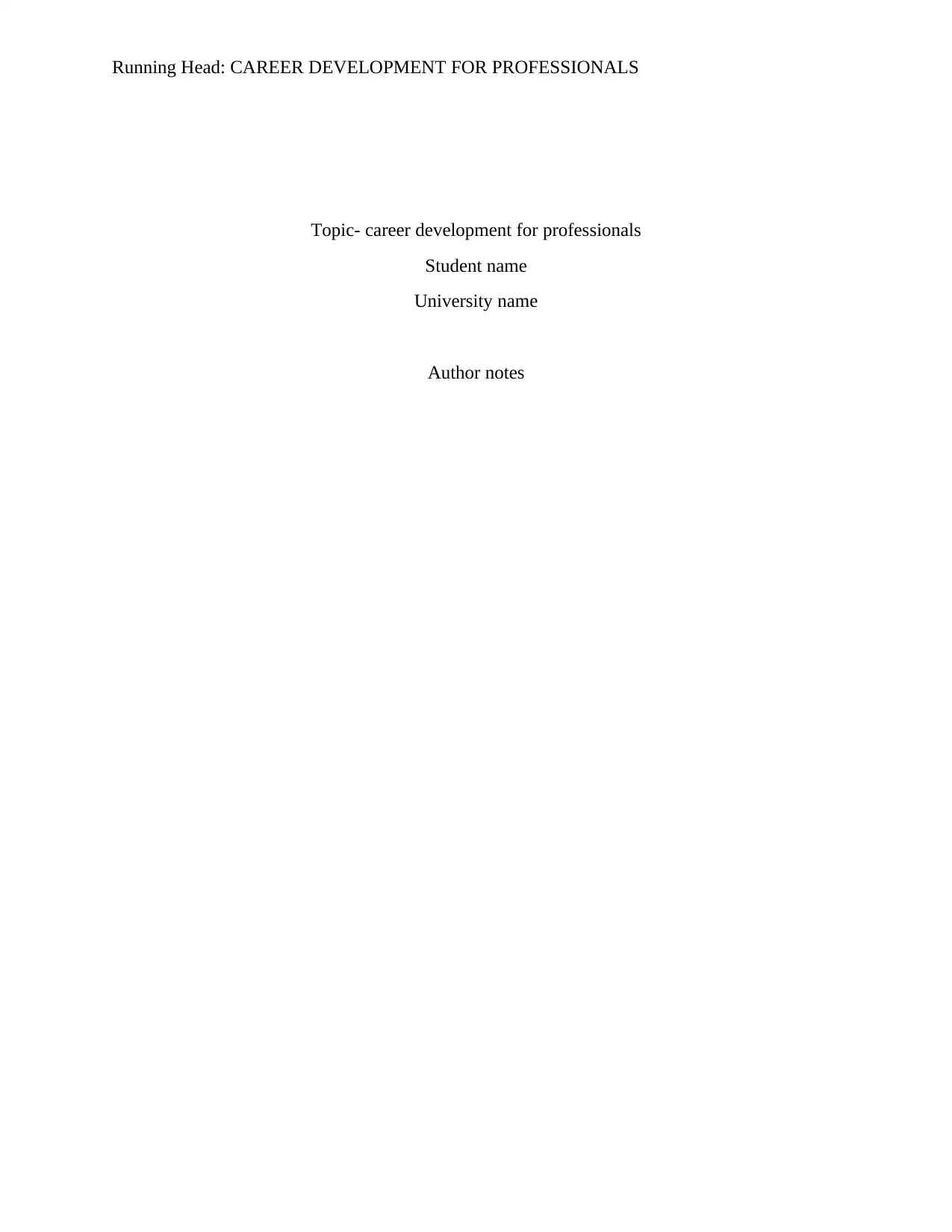
Running Head: CAREER DEVELOPMENT FOR PROFESSIONALS
Topic- career development for professionals
Student name
University name
Author notes
Topic- career development for professionals
Student name
University name
Author notes
Paraphrase This Document
Need a fresh take? Get an instant paraphrase of this document with our AI Paraphraser
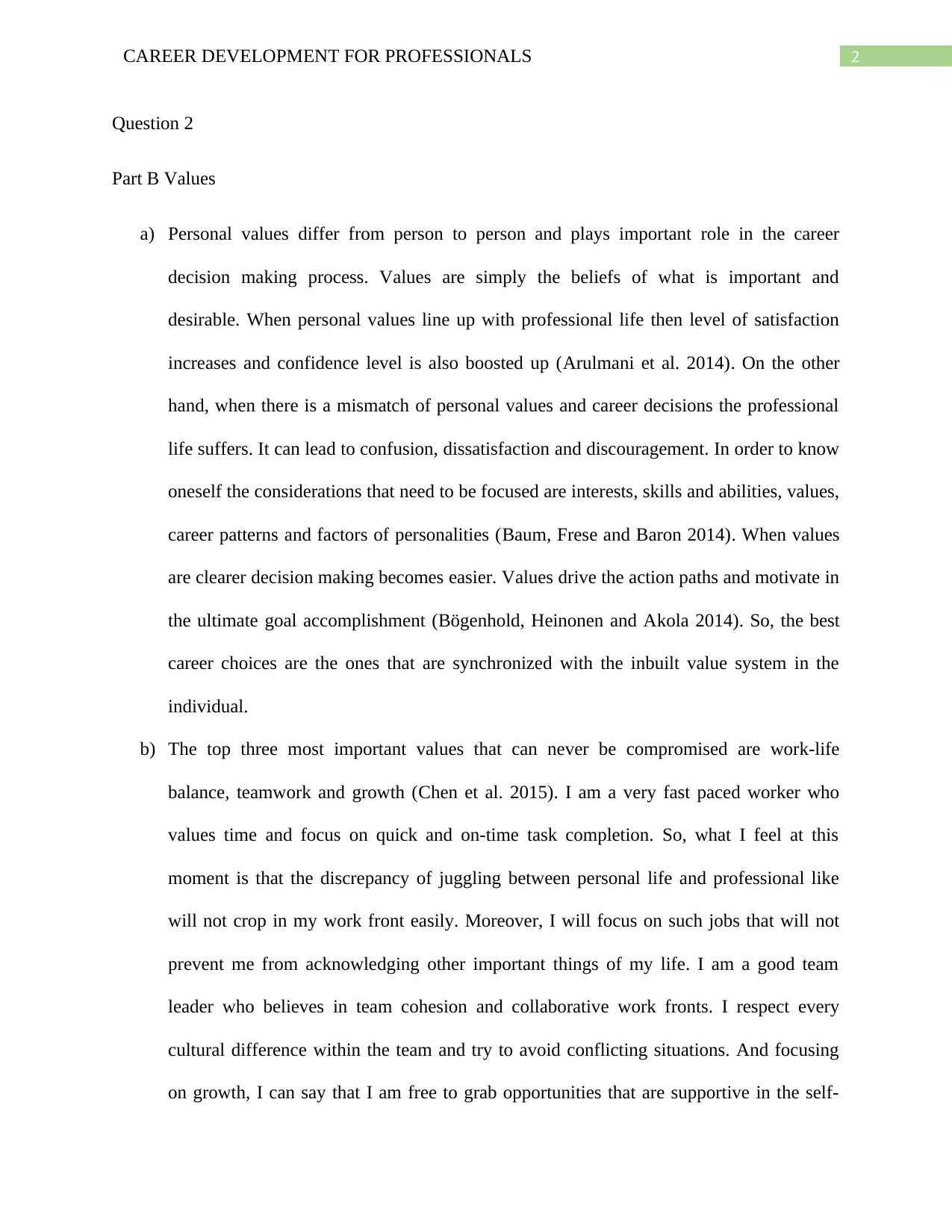
2CAREER DEVELOPMENT FOR PROFESSIONALS
Question 2
Part B Values
a) Personal values differ from person to person and plays important role in the career
decision making process. Values are simply the beliefs of what is important and
desirable. When personal values line up with professional life then level of satisfaction
increases and confidence level is also boosted up (Arulmani et al. 2014). On the other
hand, when there is a mismatch of personal values and career decisions the professional
life suffers. It can lead to confusion, dissatisfaction and discouragement. In order to know
oneself the considerations that need to be focused are interests, skills and abilities, values,
career patterns and factors of personalities (Baum, Frese and Baron 2014). When values
are clearer decision making becomes easier. Values drive the action paths and motivate in
the ultimate goal accomplishment (Bögenhold, Heinonen and Akola 2014). So, the best
career choices are the ones that are synchronized with the inbuilt value system in the
individual.
b) The top three most important values that can never be compromised are work-life
balance, teamwork and growth (Chen et al. 2015). I am a very fast paced worker who
values time and focus on quick and on-time task completion. So, what I feel at this
moment is that the discrepancy of juggling between personal life and professional like
will not crop in my work front easily. Moreover, I will focus on such jobs that will not
prevent me from acknowledging other important things of my life. I am a good team
leader who believes in team cohesion and collaborative work fronts. I respect every
cultural difference within the team and try to avoid conflicting situations. And focusing
on growth, I can say that I am free to grab opportunities that are supportive in the self-
Question 2
Part B Values
a) Personal values differ from person to person and plays important role in the career
decision making process. Values are simply the beliefs of what is important and
desirable. When personal values line up with professional life then level of satisfaction
increases and confidence level is also boosted up (Arulmani et al. 2014). On the other
hand, when there is a mismatch of personal values and career decisions the professional
life suffers. It can lead to confusion, dissatisfaction and discouragement. In order to know
oneself the considerations that need to be focused are interests, skills and abilities, values,
career patterns and factors of personalities (Baum, Frese and Baron 2014). When values
are clearer decision making becomes easier. Values drive the action paths and motivate in
the ultimate goal accomplishment (Bögenhold, Heinonen and Akola 2014). So, the best
career choices are the ones that are synchronized with the inbuilt value system in the
individual.
b) The top three most important values that can never be compromised are work-life
balance, teamwork and growth (Chen et al. 2015). I am a very fast paced worker who
values time and focus on quick and on-time task completion. So, what I feel at this
moment is that the discrepancy of juggling between personal life and professional like
will not crop in my work front easily. Moreover, I will focus on such jobs that will not
prevent me from acknowledging other important things of my life. I am a good team
leader who believes in team cohesion and collaborative work fronts. I respect every
cultural difference within the team and try to avoid conflicting situations. And focusing
on growth, I can say that I am free to grab opportunities that are supportive in the self-
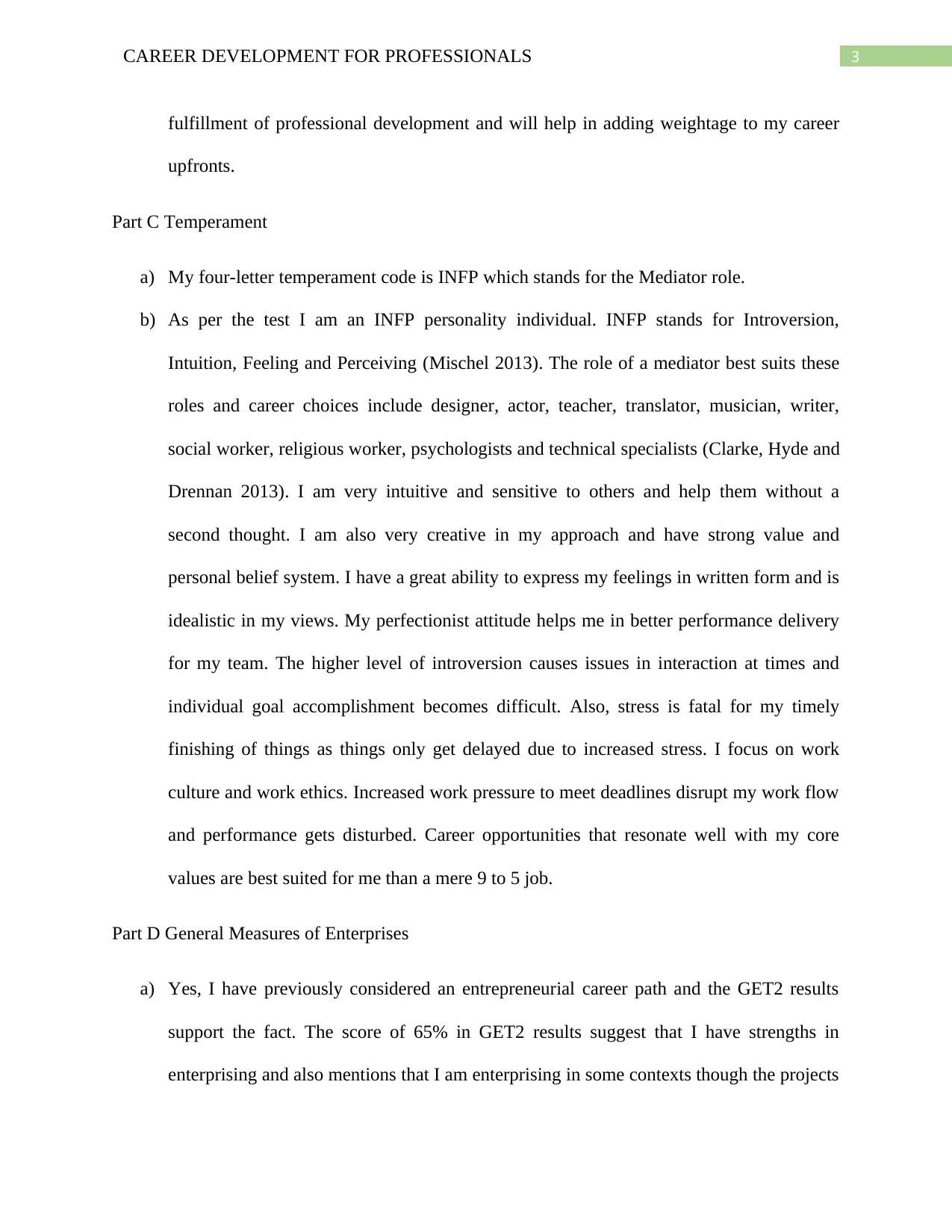
3CAREER DEVELOPMENT FOR PROFESSIONALS
fulfillment of professional development and will help in adding weightage to my career
upfronts.
Part C Temperament
a) My four-letter temperament code is INFP which stands for the Mediator role.
b) As per the test I am an INFP personality individual. INFP stands for Introversion,
Intuition, Feeling and Perceiving (Mischel 2013). The role of a mediator best suits these
roles and career choices include designer, actor, teacher, translator, musician, writer,
social worker, religious worker, psychologists and technical specialists (Clarke, Hyde and
Drennan 2013). I am very intuitive and sensitive to others and help them without a
second thought. I am also very creative in my approach and have strong value and
personal belief system. I have a great ability to express my feelings in written form and is
idealistic in my views. My perfectionist attitude helps me in better performance delivery
for my team. The higher level of introversion causes issues in interaction at times and
individual goal accomplishment becomes difficult. Also, stress is fatal for my timely
finishing of things as things only get delayed due to increased stress. I focus on work
culture and work ethics. Increased work pressure to meet deadlines disrupt my work flow
and performance gets disturbed. Career opportunities that resonate well with my core
values are best suited for me than a mere 9 to 5 job.
Part D General Measures of Enterprises
a) Yes, I have previously considered an entrepreneurial career path and the GET2 results
support the fact. The score of 65% in GET2 results suggest that I have strengths in
enterprising and also mentions that I am enterprising in some contexts though the projects
fulfillment of professional development and will help in adding weightage to my career
upfronts.
Part C Temperament
a) My four-letter temperament code is INFP which stands for the Mediator role.
b) As per the test I am an INFP personality individual. INFP stands for Introversion,
Intuition, Feeling and Perceiving (Mischel 2013). The role of a mediator best suits these
roles and career choices include designer, actor, teacher, translator, musician, writer,
social worker, religious worker, psychologists and technical specialists (Clarke, Hyde and
Drennan 2013). I am very intuitive and sensitive to others and help them without a
second thought. I am also very creative in my approach and have strong value and
personal belief system. I have a great ability to express my feelings in written form and is
idealistic in my views. My perfectionist attitude helps me in better performance delivery
for my team. The higher level of introversion causes issues in interaction at times and
individual goal accomplishment becomes difficult. Also, stress is fatal for my timely
finishing of things as things only get delayed due to increased stress. I focus on work
culture and work ethics. Increased work pressure to meet deadlines disrupt my work flow
and performance gets disturbed. Career opportunities that resonate well with my core
values are best suited for me than a mere 9 to 5 job.
Part D General Measures of Enterprises
a) Yes, I have previously considered an entrepreneurial career path and the GET2 results
support the fact. The score of 65% in GET2 results suggest that I have strengths in
enterprising and also mentions that I am enterprising in some contexts though the projects
⊘ This is a preview!⊘
Do you want full access?
Subscribe today to unlock all pages.

Trusted by 1+ million students worldwide
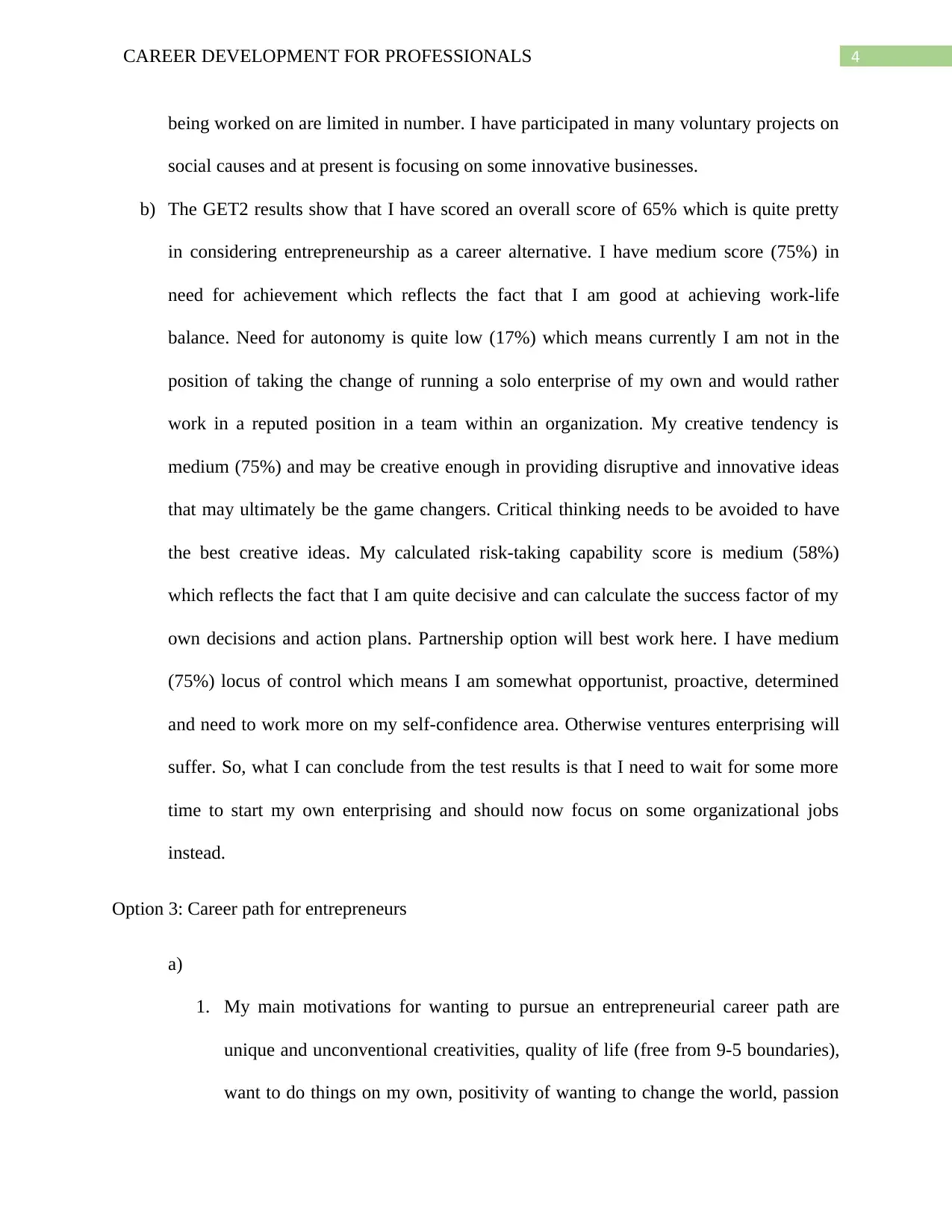
4CAREER DEVELOPMENT FOR PROFESSIONALS
being worked on are limited in number. I have participated in many voluntary projects on
social causes and at present is focusing on some innovative businesses.
b) The GET2 results show that I have scored an overall score of 65% which is quite pretty
in considering entrepreneurship as a career alternative. I have medium score (75%) in
need for achievement which reflects the fact that I am good at achieving work-life
balance. Need for autonomy is quite low (17%) which means currently I am not in the
position of taking the change of running a solo enterprise of my own and would rather
work in a reputed position in a team within an organization. My creative tendency is
medium (75%) and may be creative enough in providing disruptive and innovative ideas
that may ultimately be the game changers. Critical thinking needs to be avoided to have
the best creative ideas. My calculated risk-taking capability score is medium (58%)
which reflects the fact that I am quite decisive and can calculate the success factor of my
own decisions and action plans. Partnership option will best work here. I have medium
(75%) locus of control which means I am somewhat opportunist, proactive, determined
and need to work more on my self-confidence area. Otherwise ventures enterprising will
suffer. So, what I can conclude from the test results is that I need to wait for some more
time to start my own enterprising and should now focus on some organizational jobs
instead.
Option 3: Career path for entrepreneurs
a)
1. My main motivations for wanting to pursue an entrepreneurial career path are
unique and unconventional creativities, quality of life (free from 9-5 boundaries),
want to do things on my own, positivity of wanting to change the world, passion
being worked on are limited in number. I have participated in many voluntary projects on
social causes and at present is focusing on some innovative businesses.
b) The GET2 results show that I have scored an overall score of 65% which is quite pretty
in considering entrepreneurship as a career alternative. I have medium score (75%) in
need for achievement which reflects the fact that I am good at achieving work-life
balance. Need for autonomy is quite low (17%) which means currently I am not in the
position of taking the change of running a solo enterprise of my own and would rather
work in a reputed position in a team within an organization. My creative tendency is
medium (75%) and may be creative enough in providing disruptive and innovative ideas
that may ultimately be the game changers. Critical thinking needs to be avoided to have
the best creative ideas. My calculated risk-taking capability score is medium (58%)
which reflects the fact that I am quite decisive and can calculate the success factor of my
own decisions and action plans. Partnership option will best work here. I have medium
(75%) locus of control which means I am somewhat opportunist, proactive, determined
and need to work more on my self-confidence area. Otherwise ventures enterprising will
suffer. So, what I can conclude from the test results is that I need to wait for some more
time to start my own enterprising and should now focus on some organizational jobs
instead.
Option 3: Career path for entrepreneurs
a)
1. My main motivations for wanting to pursue an entrepreneurial career path are
unique and unconventional creativities, quality of life (free from 9-5 boundaries),
want to do things on my own, positivity of wanting to change the world, passion
Paraphrase This Document
Need a fresh take? Get an instant paraphrase of this document with our AI Paraphraser
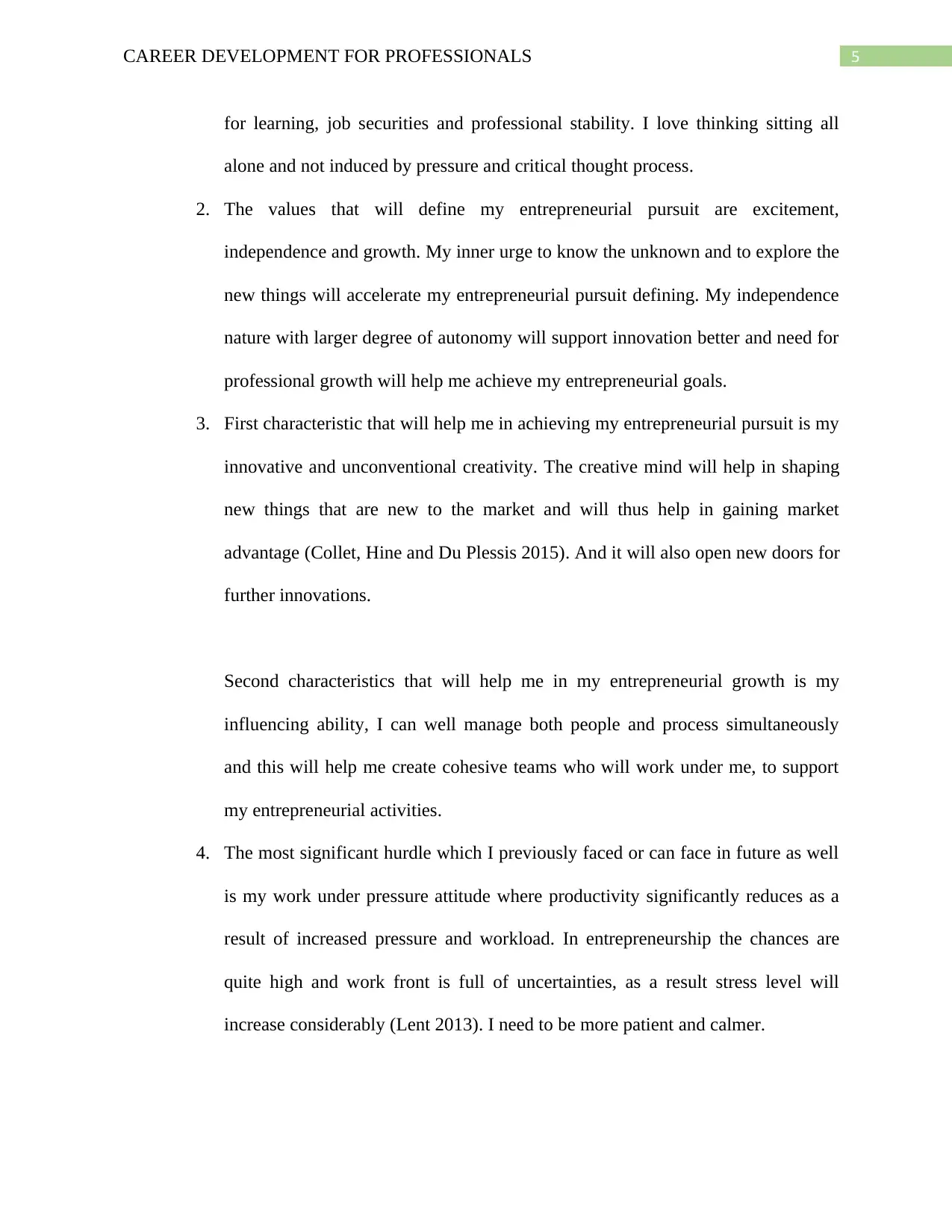
5CAREER DEVELOPMENT FOR PROFESSIONALS
for learning, job securities and professional stability. I love thinking sitting all
alone and not induced by pressure and critical thought process.
2. The values that will define my entrepreneurial pursuit are excitement,
independence and growth. My inner urge to know the unknown and to explore the
new things will accelerate my entrepreneurial pursuit defining. My independence
nature with larger degree of autonomy will support innovation better and need for
professional growth will help me achieve my entrepreneurial goals.
3. First characteristic that will help me in achieving my entrepreneurial pursuit is my
innovative and unconventional creativity. The creative mind will help in shaping
new things that are new to the market and will thus help in gaining market
advantage (Collet, Hine and Du Plessis 2015). And it will also open new doors for
further innovations.
Second characteristics that will help me in my entrepreneurial growth is my
influencing ability, I can well manage both people and process simultaneously
and this will help me create cohesive teams who will work under me, to support
my entrepreneurial activities.
4. The most significant hurdle which I previously faced or can face in future as well
is my work under pressure attitude where productivity significantly reduces as a
result of increased pressure and workload. In entrepreneurship the chances are
quite high and work front is full of uncertainties, as a result stress level will
increase considerably (Lent 2013). I need to be more patient and calmer.
for learning, job securities and professional stability. I love thinking sitting all
alone and not induced by pressure and critical thought process.
2. The values that will define my entrepreneurial pursuit are excitement,
independence and growth. My inner urge to know the unknown and to explore the
new things will accelerate my entrepreneurial pursuit defining. My independence
nature with larger degree of autonomy will support innovation better and need for
professional growth will help me achieve my entrepreneurial goals.
3. First characteristic that will help me in achieving my entrepreneurial pursuit is my
innovative and unconventional creativity. The creative mind will help in shaping
new things that are new to the market and will thus help in gaining market
advantage (Collet, Hine and Du Plessis 2015). And it will also open new doors for
further innovations.
Second characteristics that will help me in my entrepreneurial growth is my
influencing ability, I can well manage both people and process simultaneously
and this will help me create cohesive teams who will work under me, to support
my entrepreneurial activities.
4. The most significant hurdle which I previously faced or can face in future as well
is my work under pressure attitude where productivity significantly reduces as a
result of increased pressure and workload. In entrepreneurship the chances are
quite high and work front is full of uncertainties, as a result stress level will
increase considerably (Lent 2013). I need to be more patient and calmer.
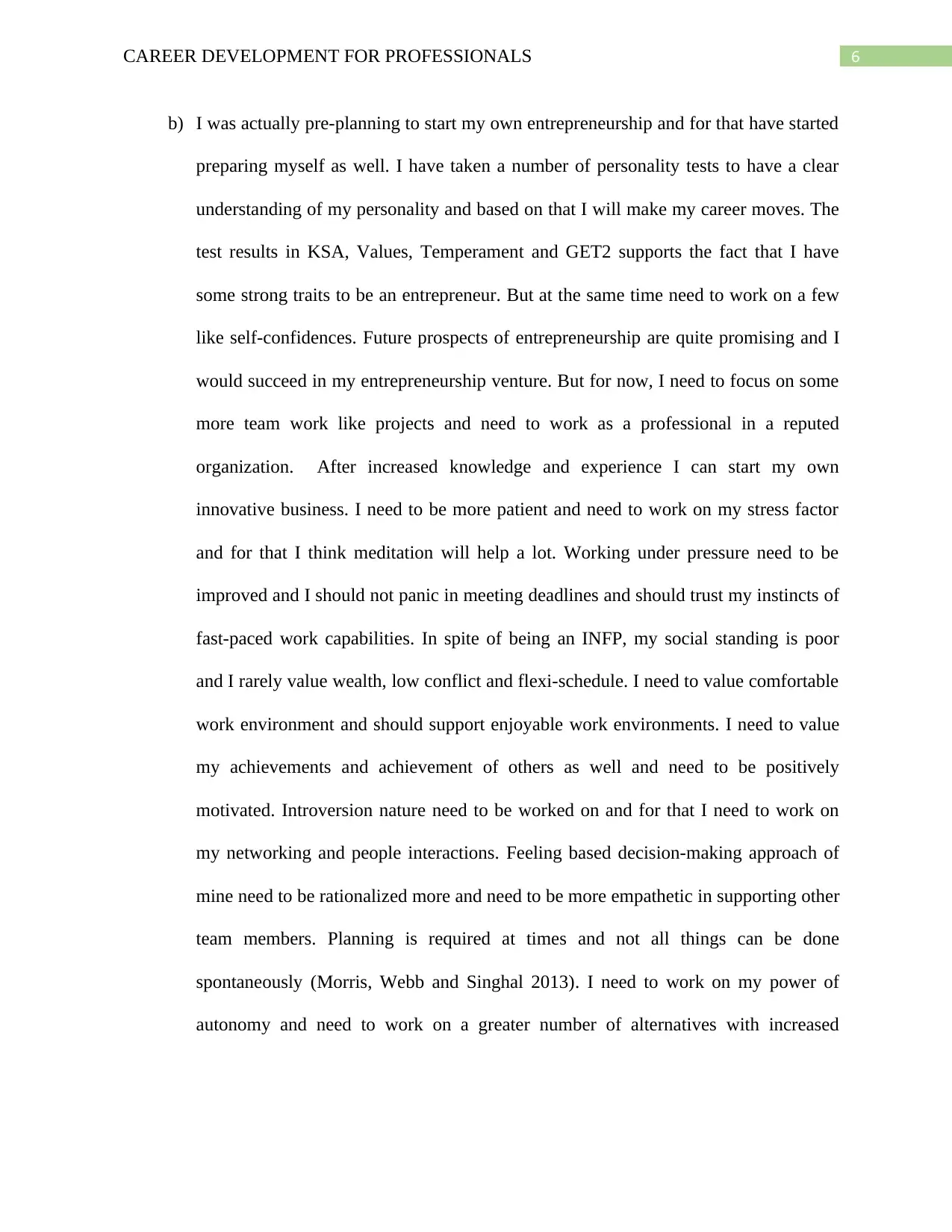
6CAREER DEVELOPMENT FOR PROFESSIONALS
b) I was actually pre-planning to start my own entrepreneurship and for that have started
preparing myself as well. I have taken a number of personality tests to have a clear
understanding of my personality and based on that I will make my career moves. The
test results in KSA, Values, Temperament and GET2 supports the fact that I have
some strong traits to be an entrepreneur. But at the same time need to work on a few
like self-confidences. Future prospects of entrepreneurship are quite promising and I
would succeed in my entrepreneurship venture. But for now, I need to focus on some
more team work like projects and need to work as a professional in a reputed
organization. After increased knowledge and experience I can start my own
innovative business. I need to be more patient and need to work on my stress factor
and for that I think meditation will help a lot. Working under pressure need to be
improved and I should not panic in meeting deadlines and should trust my instincts of
fast-paced work capabilities. In spite of being an INFP, my social standing is poor
and I rarely value wealth, low conflict and flexi-schedule. I need to value comfortable
work environment and should support enjoyable work environments. I need to value
my achievements and achievement of others as well and need to be positively
motivated. Introversion nature need to be worked on and for that I need to work on
my networking and people interactions. Feeling based decision-making approach of
mine need to be rationalized more and need to be more empathetic in supporting other
team members. Planning is required at times and not all things can be done
spontaneously (Morris, Webb and Singhal 2013). I need to work on my power of
autonomy and need to work on a greater number of alternatives with increased
b) I was actually pre-planning to start my own entrepreneurship and for that have started
preparing myself as well. I have taken a number of personality tests to have a clear
understanding of my personality and based on that I will make my career moves. The
test results in KSA, Values, Temperament and GET2 supports the fact that I have
some strong traits to be an entrepreneur. But at the same time need to work on a few
like self-confidences. Future prospects of entrepreneurship are quite promising and I
would succeed in my entrepreneurship venture. But for now, I need to focus on some
more team work like projects and need to work as a professional in a reputed
organization. After increased knowledge and experience I can start my own
innovative business. I need to be more patient and need to work on my stress factor
and for that I think meditation will help a lot. Working under pressure need to be
improved and I should not panic in meeting deadlines and should trust my instincts of
fast-paced work capabilities. In spite of being an INFP, my social standing is poor
and I rarely value wealth, low conflict and flexi-schedule. I need to value comfortable
work environment and should support enjoyable work environments. I need to value
my achievements and achievement of others as well and need to be positively
motivated. Introversion nature need to be worked on and for that I need to work on
my networking and people interactions. Feeling based decision-making approach of
mine need to be rationalized more and need to be more empathetic in supporting other
team members. Planning is required at times and not all things can be done
spontaneously (Morris, Webb and Singhal 2013). I need to work on my power of
autonomy and need to work on a greater number of alternatives with increased
⊘ This is a preview!⊘
Do you want full access?
Subscribe today to unlock all pages.

Trusted by 1+ million students worldwide
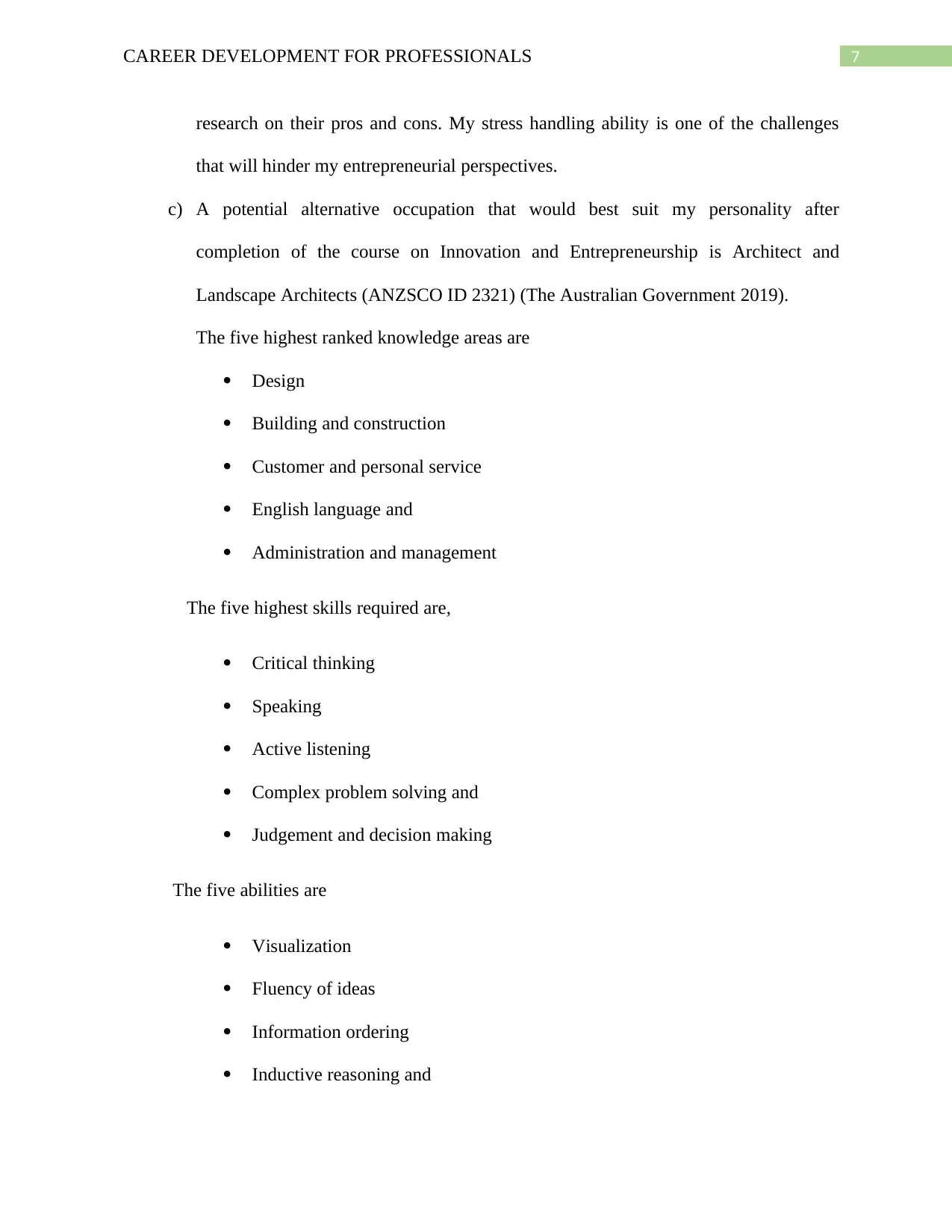
7CAREER DEVELOPMENT FOR PROFESSIONALS
research on their pros and cons. My stress handling ability is one of the challenges
that will hinder my entrepreneurial perspectives.
c) A potential alternative occupation that would best suit my personality after
completion of the course on Innovation and Entrepreneurship is Architect and
Landscape Architects (ANZSCO ID 2321) (The Australian Government 2019).
The five highest ranked knowledge areas are
Design
Building and construction
Customer and personal service
English language and
Administration and management
The five highest skills required are,
Critical thinking
Speaking
Active listening
Complex problem solving and
Judgement and decision making
The five abilities are
Visualization
Fluency of ideas
Information ordering
Inductive reasoning and
research on their pros and cons. My stress handling ability is one of the challenges
that will hinder my entrepreneurial perspectives.
c) A potential alternative occupation that would best suit my personality after
completion of the course on Innovation and Entrepreneurship is Architect and
Landscape Architects (ANZSCO ID 2321) (The Australian Government 2019).
The five highest ranked knowledge areas are
Design
Building and construction
Customer and personal service
English language and
Administration and management
The five highest skills required are,
Critical thinking
Speaking
Active listening
Complex problem solving and
Judgement and decision making
The five abilities are
Visualization
Fluency of ideas
Information ordering
Inductive reasoning and
Paraphrase This Document
Need a fresh take? Get an instant paraphrase of this document with our AI Paraphraser
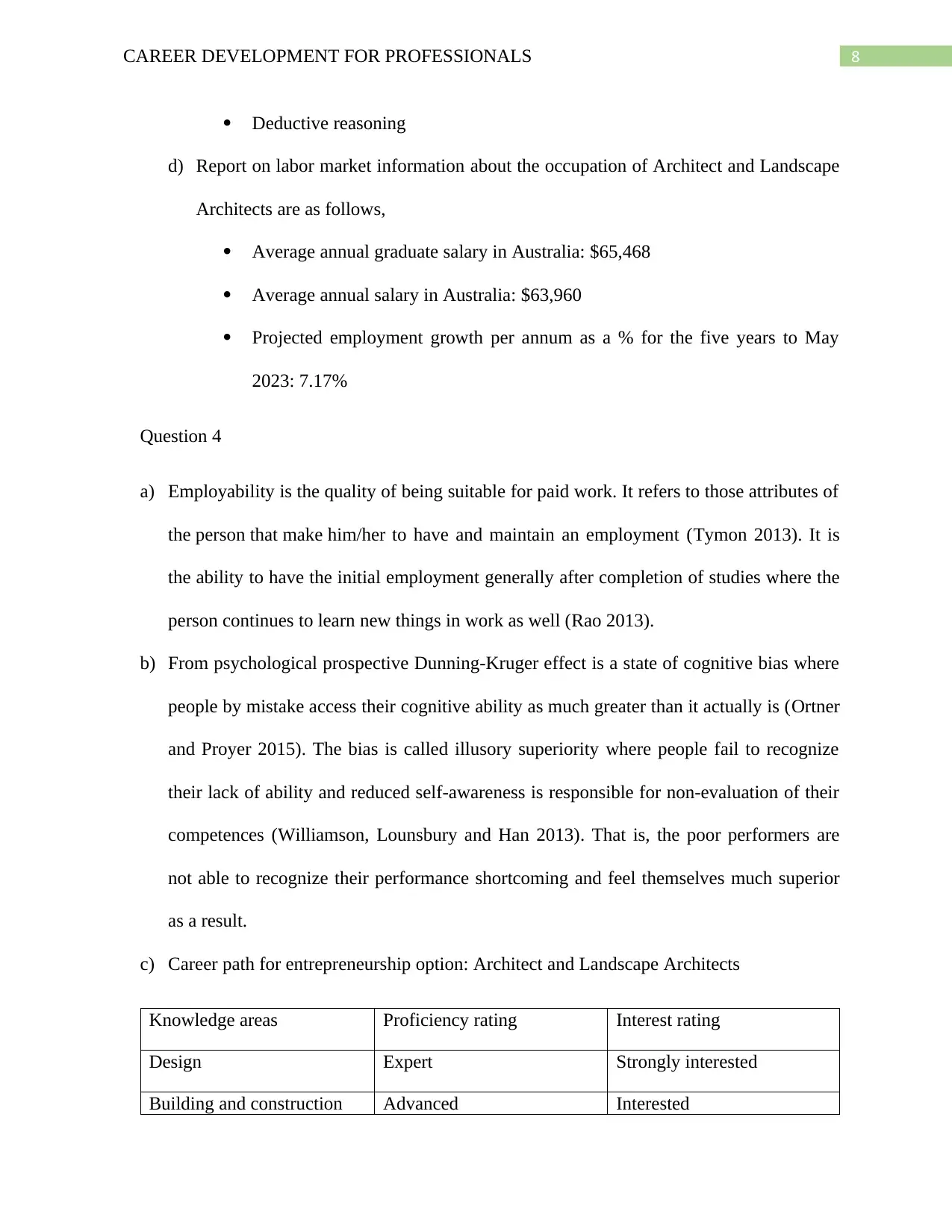
8CAREER DEVELOPMENT FOR PROFESSIONALS
Deductive reasoning
d) Report on labor market information about the occupation of Architect and Landscape
Architects are as follows,
Average annual graduate salary in Australia: $65,468
Average annual salary in Australia: $63,960
Projected employment growth per annum as a % for the five years to May
2023: 7.17%
Question 4
a) Employability is the quality of being suitable for paid work. It refers to those attributes of
the person that make him/her to have and maintain an employment (Tymon 2013). It is
the ability to have the initial employment generally after completion of studies where the
person continues to learn new things in work as well (Rao 2013).
b) From psychological prospective Dunning-Kruger effect is a state of cognitive bias where
people by mistake access their cognitive ability as much greater than it actually is (Ortner
and Proyer 2015). The bias is called illusory superiority where people fail to recognize
their lack of ability and reduced self-awareness is responsible for non-evaluation of their
competences (Williamson, Lounsbury and Han 2013). That is, the poor performers are
not able to recognize their performance shortcoming and feel themselves much superior
as a result.
c) Career path for entrepreneurship option: Architect and Landscape Architects
Knowledge areas Proficiency rating Interest rating
Design Expert Strongly interested
Building and construction Advanced Interested
Deductive reasoning
d) Report on labor market information about the occupation of Architect and Landscape
Architects are as follows,
Average annual graduate salary in Australia: $65,468
Average annual salary in Australia: $63,960
Projected employment growth per annum as a % for the five years to May
2023: 7.17%
Question 4
a) Employability is the quality of being suitable for paid work. It refers to those attributes of
the person that make him/her to have and maintain an employment (Tymon 2013). It is
the ability to have the initial employment generally after completion of studies where the
person continues to learn new things in work as well (Rao 2013).
b) From psychological prospective Dunning-Kruger effect is a state of cognitive bias where
people by mistake access their cognitive ability as much greater than it actually is (Ortner
and Proyer 2015). The bias is called illusory superiority where people fail to recognize
their lack of ability and reduced self-awareness is responsible for non-evaluation of their
competences (Williamson, Lounsbury and Han 2013). That is, the poor performers are
not able to recognize their performance shortcoming and feel themselves much superior
as a result.
c) Career path for entrepreneurship option: Architect and Landscape Architects
Knowledge areas Proficiency rating Interest rating
Design Expert Strongly interested
Building and construction Advanced Interested
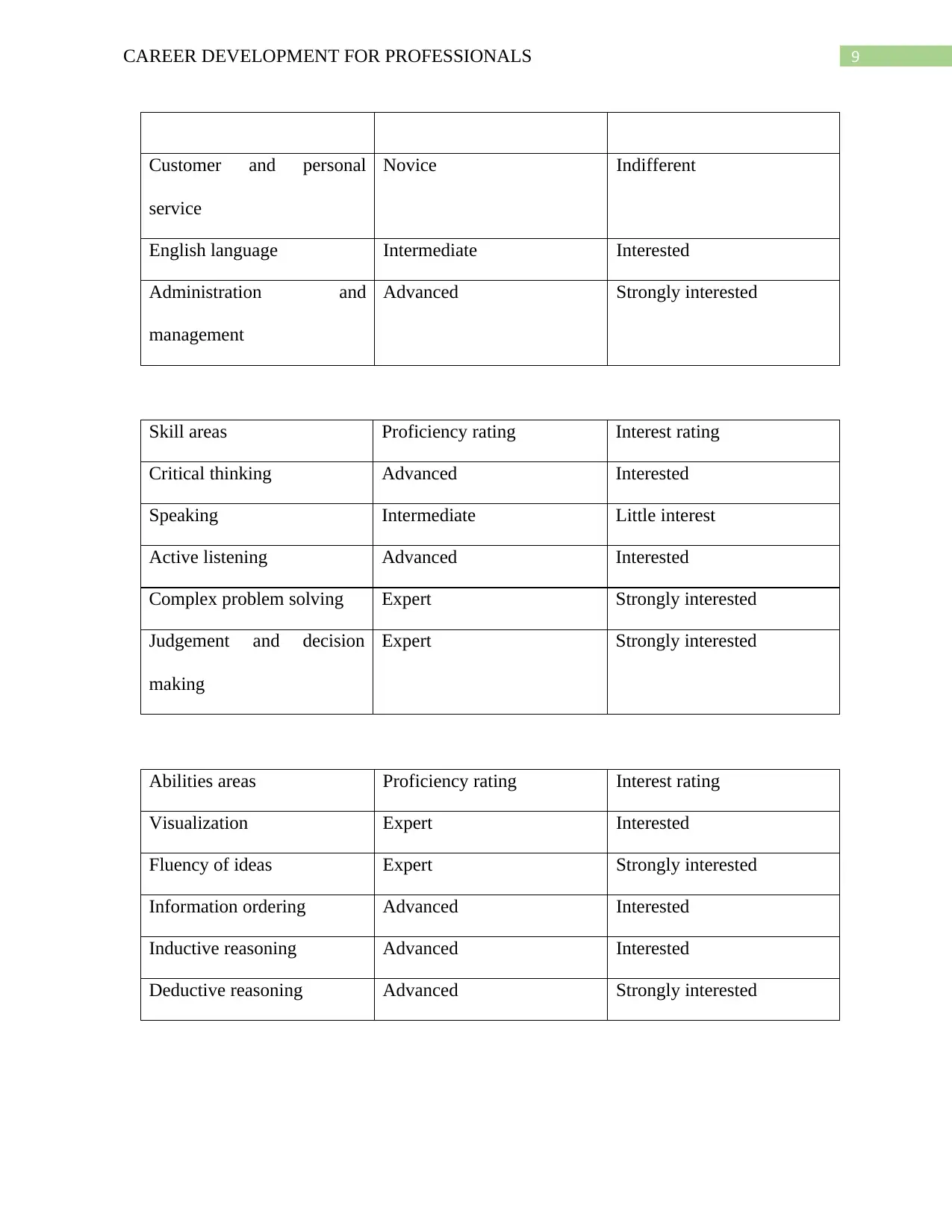
9CAREER DEVELOPMENT FOR PROFESSIONALS
Customer and personal
service
Novice Indifferent
English language Intermediate Interested
Administration and
management
Advanced Strongly interested
Skill areas Proficiency rating Interest rating
Critical thinking Advanced Interested
Speaking Intermediate Little interest
Active listening Advanced Interested
Complex problem solving Expert Strongly interested
Judgement and decision
making
Expert Strongly interested
Abilities areas Proficiency rating Interest rating
Visualization Expert Interested
Fluency of ideas Expert Strongly interested
Information ordering Advanced Interested
Inductive reasoning Advanced Interested
Deductive reasoning Advanced Strongly interested
Customer and personal
service
Novice Indifferent
English language Intermediate Interested
Administration and
management
Advanced Strongly interested
Skill areas Proficiency rating Interest rating
Critical thinking Advanced Interested
Speaking Intermediate Little interest
Active listening Advanced Interested
Complex problem solving Expert Strongly interested
Judgement and decision
making
Expert Strongly interested
Abilities areas Proficiency rating Interest rating
Visualization Expert Interested
Fluency of ideas Expert Strongly interested
Information ordering Advanced Interested
Inductive reasoning Advanced Interested
Deductive reasoning Advanced Strongly interested
⊘ This is a preview!⊘
Do you want full access?
Subscribe today to unlock all pages.

Trusted by 1+ million students worldwide
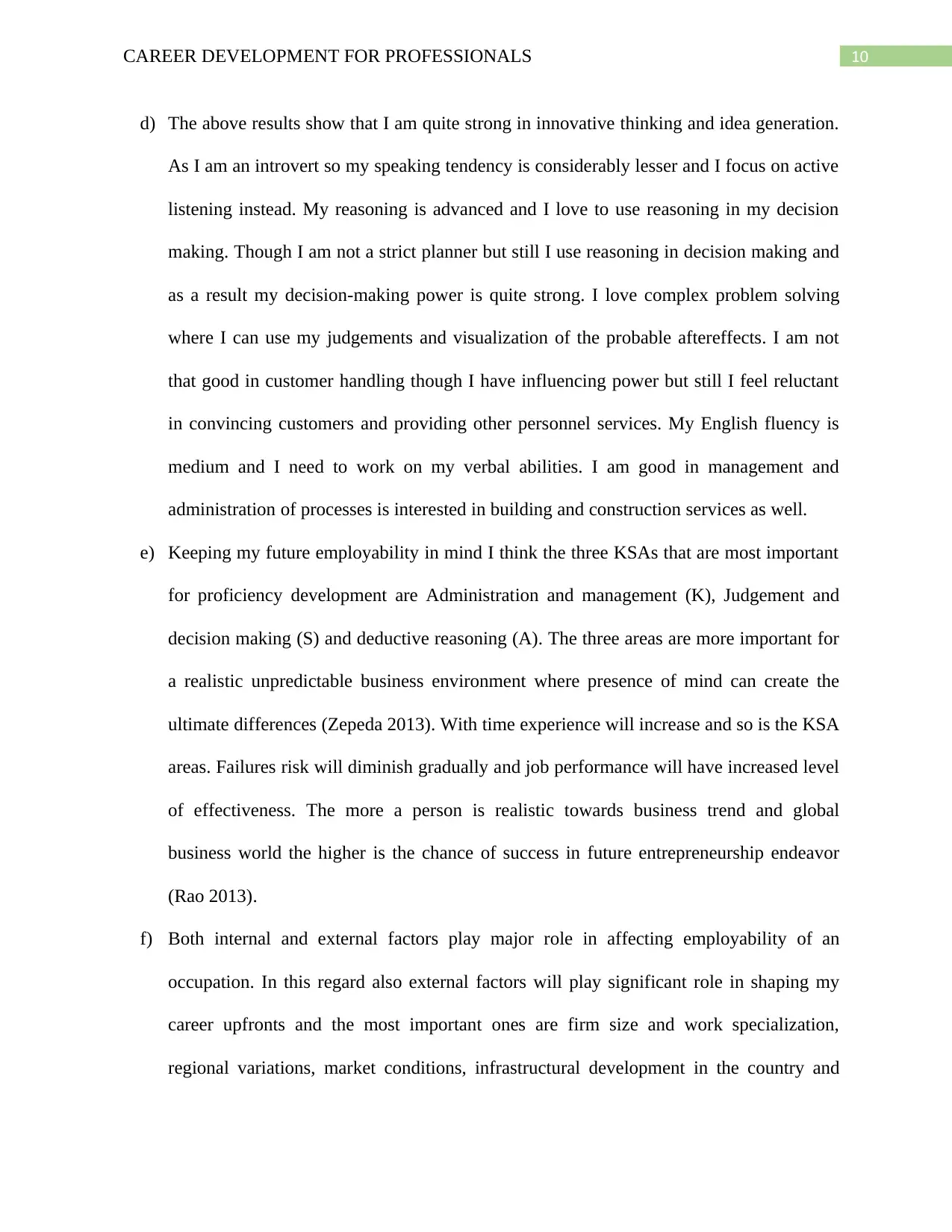
10CAREER DEVELOPMENT FOR PROFESSIONALS
d) The above results show that I am quite strong in innovative thinking and idea generation.
As I am an introvert so my speaking tendency is considerably lesser and I focus on active
listening instead. My reasoning is advanced and I love to use reasoning in my decision
making. Though I am not a strict planner but still I use reasoning in decision making and
as a result my decision-making power is quite strong. I love complex problem solving
where I can use my judgements and visualization of the probable aftereffects. I am not
that good in customer handling though I have influencing power but still I feel reluctant
in convincing customers and providing other personnel services. My English fluency is
medium and I need to work on my verbal abilities. I am good in management and
administration of processes is interested in building and construction services as well.
e) Keeping my future employability in mind I think the three KSAs that are most important
for proficiency development are Administration and management (K), Judgement and
decision making (S) and deductive reasoning (A). The three areas are more important for
a realistic unpredictable business environment where presence of mind can create the
ultimate differences (Zepeda 2013). With time experience will increase and so is the KSA
areas. Failures risk will diminish gradually and job performance will have increased level
of effectiveness. The more a person is realistic towards business trend and global
business world the higher is the chance of success in future entrepreneurship endeavor
(Rao 2013).
f) Both internal and external factors play major role in affecting employability of an
occupation. In this regard also external factors will play significant role in shaping my
career upfronts and the most important ones are firm size and work specialization,
regional variations, market conditions, infrastructural development in the country and
d) The above results show that I am quite strong in innovative thinking and idea generation.
As I am an introvert so my speaking tendency is considerably lesser and I focus on active
listening instead. My reasoning is advanced and I love to use reasoning in my decision
making. Though I am not a strict planner but still I use reasoning in decision making and
as a result my decision-making power is quite strong. I love complex problem solving
where I can use my judgements and visualization of the probable aftereffects. I am not
that good in customer handling though I have influencing power but still I feel reluctant
in convincing customers and providing other personnel services. My English fluency is
medium and I need to work on my verbal abilities. I am good in management and
administration of processes is interested in building and construction services as well.
e) Keeping my future employability in mind I think the three KSAs that are most important
for proficiency development are Administration and management (K), Judgement and
decision making (S) and deductive reasoning (A). The three areas are more important for
a realistic unpredictable business environment where presence of mind can create the
ultimate differences (Zepeda 2013). With time experience will increase and so is the KSA
areas. Failures risk will diminish gradually and job performance will have increased level
of effectiveness. The more a person is realistic towards business trend and global
business world the higher is the chance of success in future entrepreneurship endeavor
(Rao 2013).
f) Both internal and external factors play major role in affecting employability of an
occupation. In this regard also external factors will play significant role in shaping my
career upfronts and the most important ones are firm size and work specialization,
regional variations, market conditions, infrastructural development in the country and
Paraphrase This Document
Need a fresh take? Get an instant paraphrase of this document with our AI Paraphraser
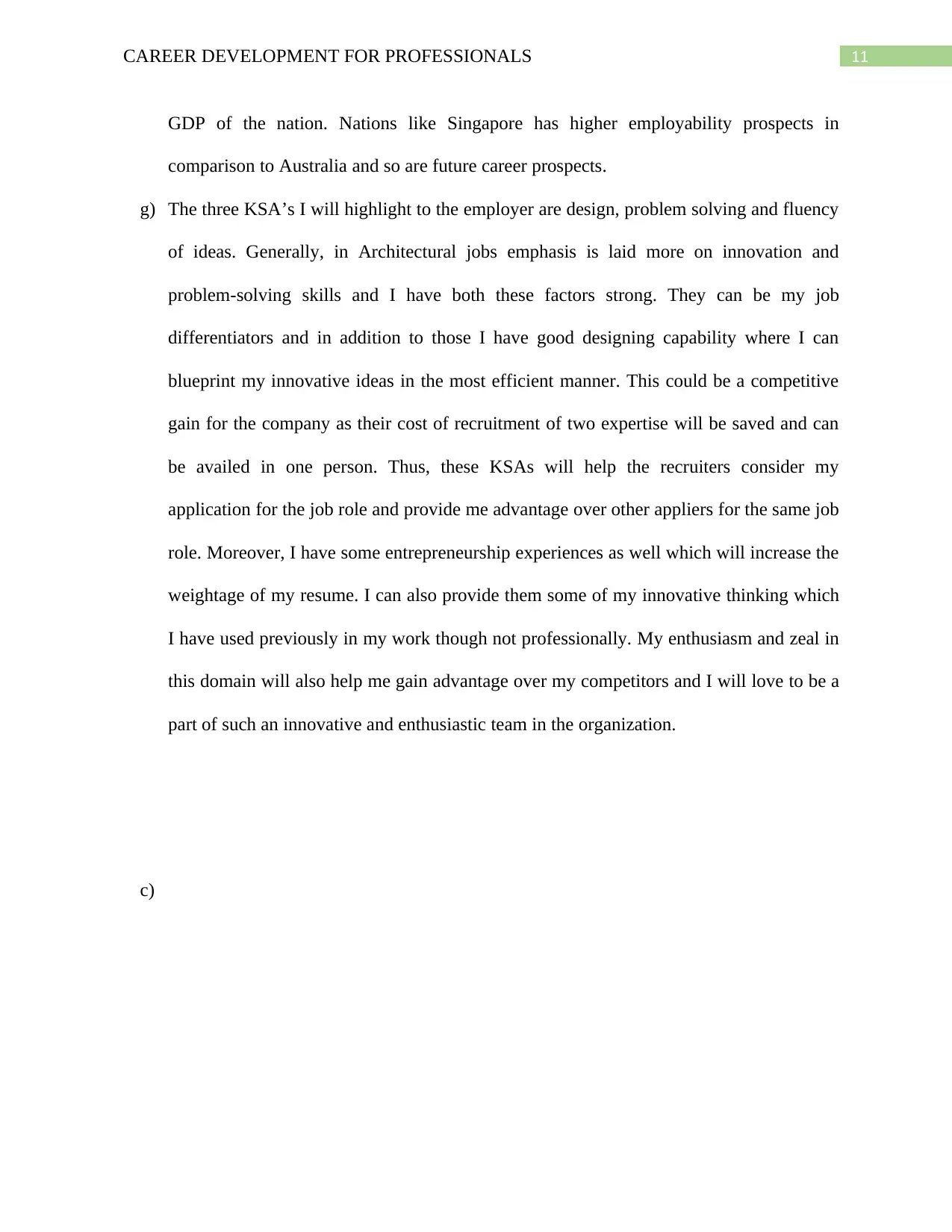
11CAREER DEVELOPMENT FOR PROFESSIONALS
GDP of the nation. Nations like Singapore has higher employability prospects in
comparison to Australia and so are future career prospects.
g) The three KSA’s I will highlight to the employer are design, problem solving and fluency
of ideas. Generally, in Architectural jobs emphasis is laid more on innovation and
problem-solving skills and I have both these factors strong. They can be my job
differentiators and in addition to those I have good designing capability where I can
blueprint my innovative ideas in the most efficient manner. This could be a competitive
gain for the company as their cost of recruitment of two expertise will be saved and can
be availed in one person. Thus, these KSAs will help the recruiters consider my
application for the job role and provide me advantage over other appliers for the same job
role. Moreover, I have some entrepreneurship experiences as well which will increase the
weightage of my resume. I can also provide them some of my innovative thinking which
I have used previously in my work though not professionally. My enthusiasm and zeal in
this domain will also help me gain advantage over my competitors and I will love to be a
part of such an innovative and enthusiastic team in the organization.
c)
GDP of the nation. Nations like Singapore has higher employability prospects in
comparison to Australia and so are future career prospects.
g) The three KSA’s I will highlight to the employer are design, problem solving and fluency
of ideas. Generally, in Architectural jobs emphasis is laid more on innovation and
problem-solving skills and I have both these factors strong. They can be my job
differentiators and in addition to those I have good designing capability where I can
blueprint my innovative ideas in the most efficient manner. This could be a competitive
gain for the company as their cost of recruitment of two expertise will be saved and can
be availed in one person. Thus, these KSAs will help the recruiters consider my
application for the job role and provide me advantage over other appliers for the same job
role. Moreover, I have some entrepreneurship experiences as well which will increase the
weightage of my resume. I can also provide them some of my innovative thinking which
I have used previously in my work though not professionally. My enthusiasm and zeal in
this domain will also help me gain advantage over my competitors and I will love to be a
part of such an innovative and enthusiastic team in the organization.
c)
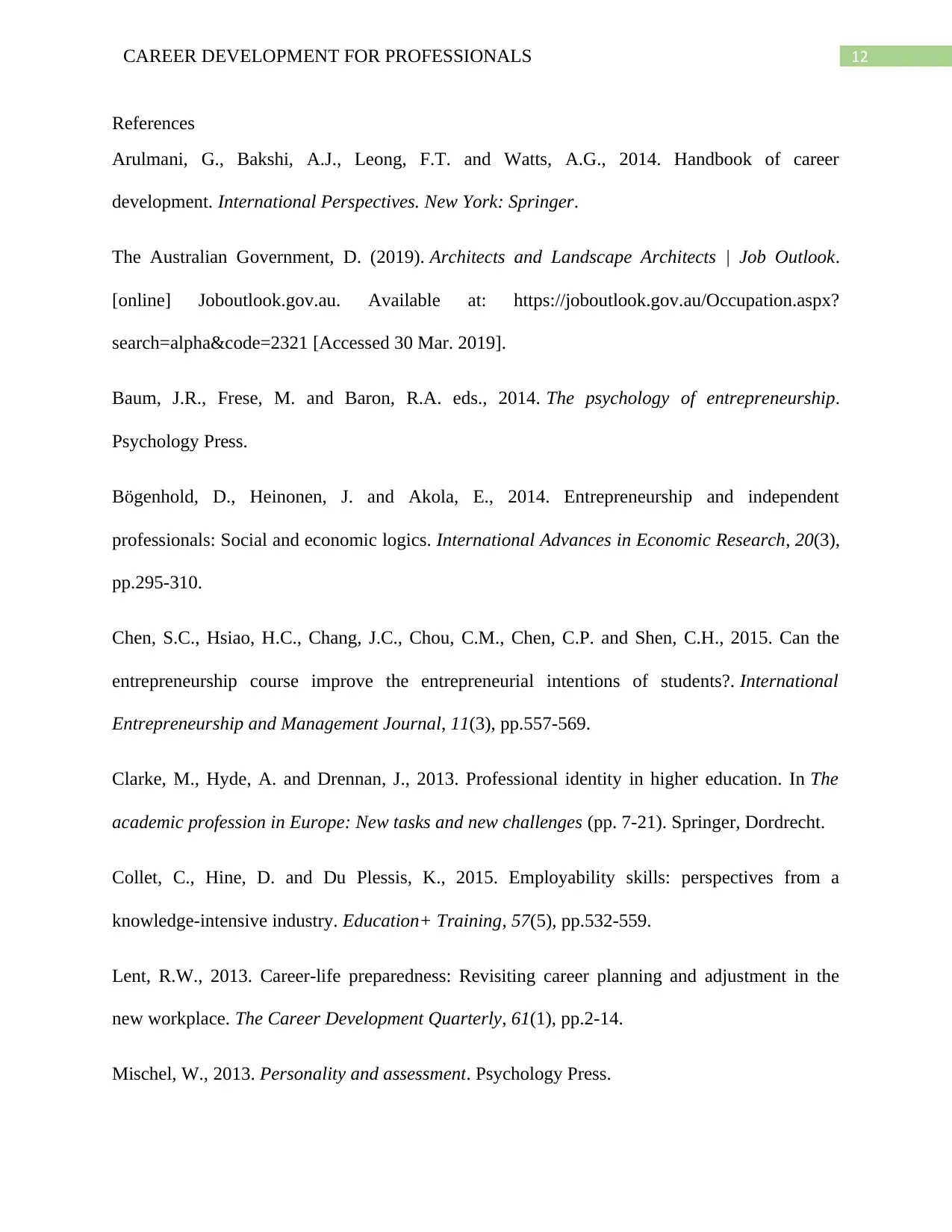
12CAREER DEVELOPMENT FOR PROFESSIONALS
References
Arulmani, G., Bakshi, A.J., Leong, F.T. and Watts, A.G., 2014. Handbook of career
development. International Perspectives. New York: Springer.
The Australian Government, D. (2019). Architects and Landscape Architects | Job Outlook.
[online] Joboutlook.gov.au. Available at: https://joboutlook.gov.au/Occupation.aspx?
search=alpha&code=2321 [Accessed 30 Mar. 2019].
Baum, J.R., Frese, M. and Baron, R.A. eds., 2014. The psychology of entrepreneurship.
Psychology Press.
Bögenhold, D., Heinonen, J. and Akola, E., 2014. Entrepreneurship and independent
professionals: Social and economic logics. International Advances in Economic Research, 20(3),
pp.295-310.
Chen, S.C., Hsiao, H.C., Chang, J.C., Chou, C.M., Chen, C.P. and Shen, C.H., 2015. Can the
entrepreneurship course improve the entrepreneurial intentions of students?. International
Entrepreneurship and Management Journal, 11(3), pp.557-569.
Clarke, M., Hyde, A. and Drennan, J., 2013. Professional identity in higher education. In The
academic profession in Europe: New tasks and new challenges (pp. 7-21). Springer, Dordrecht.
Collet, C., Hine, D. and Du Plessis, K., 2015. Employability skills: perspectives from a
knowledge-intensive industry. Education+ Training, 57(5), pp.532-559.
Lent, R.W., 2013. Career‐life preparedness: Revisiting career planning and adjustment in the
new workplace. The Career Development Quarterly, 61(1), pp.2-14.
Mischel, W., 2013. Personality and assessment. Psychology Press.
References
Arulmani, G., Bakshi, A.J., Leong, F.T. and Watts, A.G., 2014. Handbook of career
development. International Perspectives. New York: Springer.
The Australian Government, D. (2019). Architects and Landscape Architects | Job Outlook.
[online] Joboutlook.gov.au. Available at: https://joboutlook.gov.au/Occupation.aspx?
search=alpha&code=2321 [Accessed 30 Mar. 2019].
Baum, J.R., Frese, M. and Baron, R.A. eds., 2014. The psychology of entrepreneurship.
Psychology Press.
Bögenhold, D., Heinonen, J. and Akola, E., 2014. Entrepreneurship and independent
professionals: Social and economic logics. International Advances in Economic Research, 20(3),
pp.295-310.
Chen, S.C., Hsiao, H.C., Chang, J.C., Chou, C.M., Chen, C.P. and Shen, C.H., 2015. Can the
entrepreneurship course improve the entrepreneurial intentions of students?. International
Entrepreneurship and Management Journal, 11(3), pp.557-569.
Clarke, M., Hyde, A. and Drennan, J., 2013. Professional identity in higher education. In The
academic profession in Europe: New tasks and new challenges (pp. 7-21). Springer, Dordrecht.
Collet, C., Hine, D. and Du Plessis, K., 2015. Employability skills: perspectives from a
knowledge-intensive industry. Education+ Training, 57(5), pp.532-559.
Lent, R.W., 2013. Career‐life preparedness: Revisiting career planning and adjustment in the
new workplace. The Career Development Quarterly, 61(1), pp.2-14.
Mischel, W., 2013. Personality and assessment. Psychology Press.
⊘ This is a preview!⊘
Do you want full access?
Subscribe today to unlock all pages.

Trusted by 1+ million students worldwide
1 out of 14
Related Documents
Your All-in-One AI-Powered Toolkit for Academic Success.
+13062052269
info@desklib.com
Available 24*7 on WhatsApp / Email
![[object Object]](/_next/static/media/star-bottom.7253800d.svg)
Unlock your academic potential
Copyright © 2020–2026 A2Z Services. All Rights Reserved. Developed and managed by ZUCOL.





